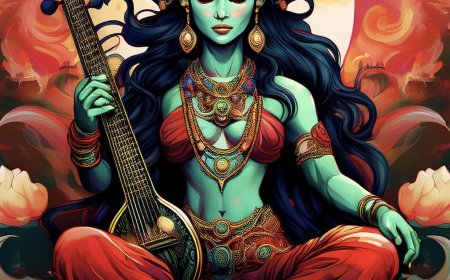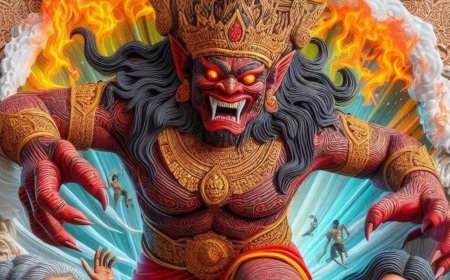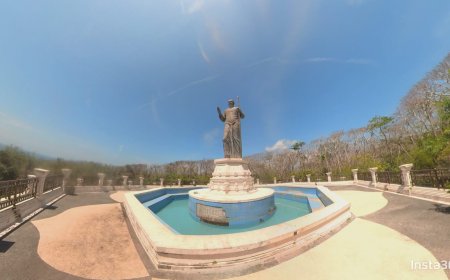The Legend of Taru Menyan: The Fragrant Aroma Behind The Funeral Tradition in Trunyan Village
The Trunyan Village, which located in Bangli Regency, is famous for its Mepasah tradition, where corpses are left to rot under the Menyan tree without emitting an unpleasant aroma. The origins of this tradition began with the four children of the King of the Keraton Surakarta who began a journey to find the source of the fragrance that came from the east side of where they lived, namely the island of Bali. The journey ended with the discovery of the Taru Menyan which led to the birth of the Mepasah tradition in Trunyan Village.

Most of Balinese people are already familiar with Trunyan Village. Trunyan Village is located in Kintamani District, Bangli Regency and is close to Lake Batur, precisely to the east side of the largest lake of Bali. Trunyan Village is one of the oldest villages in Bali and is still inhabited by native Balinese people or known as Bali Aga.
The name "Trunyan" comes from the words Taru and Menyan. Taru means tree and Menyan is another name for the incense tree (Kemenyan). In Trunyan Village, there is a unique and interesting tradition to bury a corpse. This tradition is called Mepasah. This tradition is carried out by leaving the body to simply rot under a Menyan tree and only covered by woven bamboo. Miraculously, there was no strong aroma coming from the corpse.
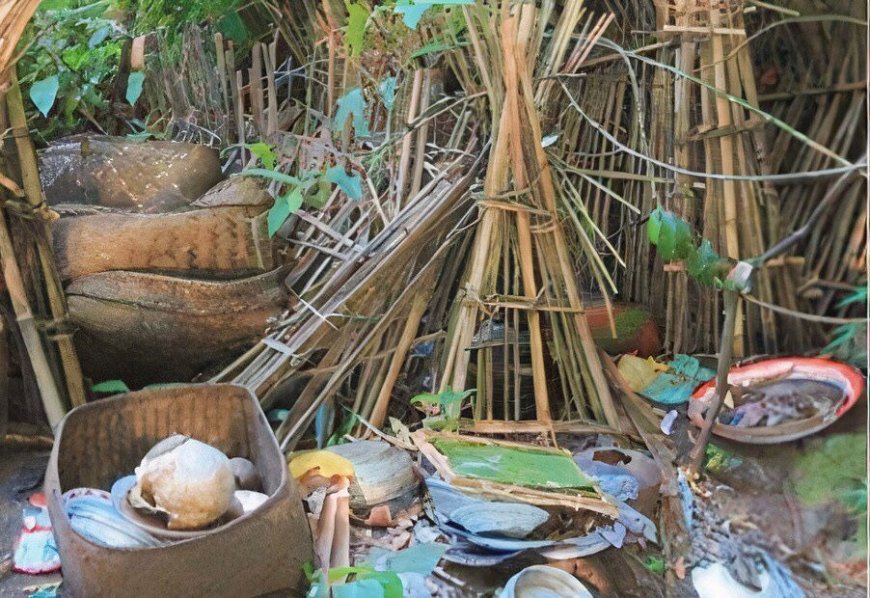
Woven Bamboo Covering the Deceased's Body (Source: Editorial Collection)
This can happen because the tree emits a fragrant aroma which can cover up the unpleasant aroma that can come out because of the decomposition process of the corpse. Interestingly, there is an unique story behind the Menyan tree in Trunyan Village which is the origins of the Mepasah tradition.
The story begins with a king who reigns in the Keraton of Surakarta . The King had 4 children, 3 princes and a youngest daughter. The king's four children lived around the palace. One day, the king's children smelled a strong fragrance which attracted their sense of smell. However, they did not know the exact source of the fragrance.
The king's youngest daughter then told her three brothers that the fragrance came from the east. Suddenly, these words aroused the curiosity of the king's three sons to find out the source of the strong aroma. They then agreed to ask the king for permission to travel eastward to seek answers to their curiosity about the source of the fragrance.
After getting permission from the king, the four siblings then prepared carefully to find the source of the fragrance. When everything felt ready, they began their journey eastward. The more they moved eastward, the more intense the fragrance they smelled, and their curiosity became stronger.
It took months for the four siblings to be able to cross the strait which is now known as Selat Bali. They need to cross rivers, pass through mountains and hills, and face wild animals. Until finally, they managed to land on an island called Bali Island.
They continued their journey to find the source of the fragrant smell. Over time, the smell gets stronger. This made them believe that it would not take long for them to find the source of the fragrance they were referring to.
The three remaining siblings then continued their journey to find the source of the fragrance that had intrigued them from the start. After arriving in the Kedisan area, which is located southwest of Lake Batur, the three brothers heard birds chirping which was very melodious to their ears.
The chirping of the birds made the third prince cheer with joy. This apparently caused a negative reaction from the eldest prince. The eldest prince was apparently disturbed by the third prince's shouting and thought that this attitude should not be shown by a prince. The eldest prince, who was annoyed, then offered the third prince to just stay there. However, the third prince apparently wanted to accompany his two older brothers to continue their journey.
The eldest prince was covered in angered and led to a fight. The eldest prince kicked the third prince until he fell in a cross-legged sitting position. The third prince then turned into a statue. The statue of the third prince became known as the “Bhatara” Statue which also means "The Statue of God". The statue was then given the title Ratu Sakti Sang Hyang Jero and to this day resides in the sacred building Meru Tumpang Pitu which is in Pura Dalem Pingit, Kedisan Village.
The two remaining princes then continued their journey. When they walked along the eastern part of Lake Batur, the second prince was interested and greeted the beautiful girls around the area. This attitude once again sparked anger from the first prince. The first prince then asked his younger brother not to continue the journey. This order was rejected by the second prince. Finally, a fight broke out between the two brothers. The first prince kicked his younger brother again until he fell to the ground. The second prince then stayed and became the head of the village in the area. The area was then given the name Abang Dukuh Village.
Long story short, the eldest prince continued his journey by himself. Until finally, the prince arrived at the Taru Menyan tree which turned out to be the source of the fragrant aroma that had made him curious from the beginning. There, the prince met a beautiful woman sitting under a tree. The prince was captivated by her beauty and intended to marry her. The goddess accepted the proposal, and the wedding party was held.
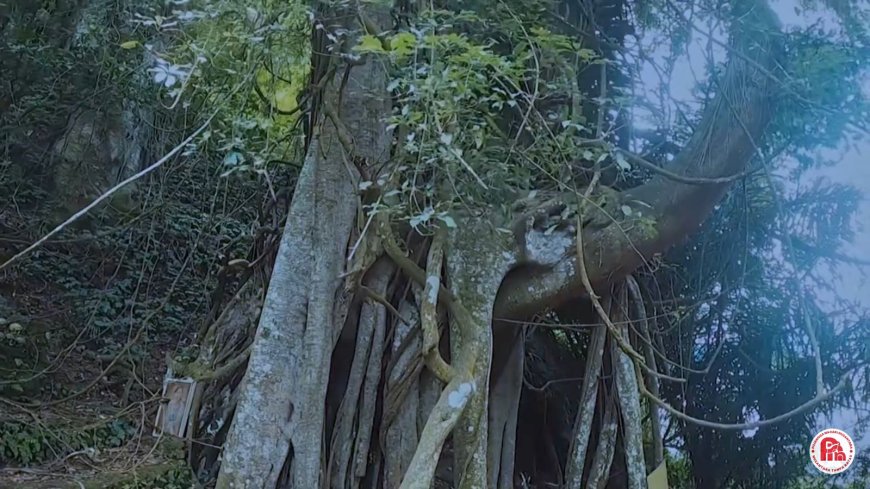
The Legendary Menyan Tree in Trunyan Village (Source: Pujangga Nagari Nusantara Channel)
The first prince then became the village leader or Pancer Jagat. The village was then given the name Trunyan Village which comes from Taru Menyan. The prince was given the title Ratu Sakti Pancering Jagat, while his wife was given the title Ratu Ayu Pingit Dalam Dasar, who later became the protector of Lake Batur. The first prince, who was later called Ratu Sakti Pancering Jagat, wanted to maintain the security of his area from the outsiders who might be attracted by the aroma of the Taru Menyan. Therefore, he ordered his people that if someone died, their body should not be buried, but left to rot near the Taru Menyan. This was done with the aim of neutralizing the fragrant aroma produced by the taru menyan tree, so that no outsiders would come that could potentially threatening the safety of the village.
Since then, residents of Trunyan Village have always buried their bodies under the Menyan tree. However, not just anyone can be buried in a Mepasah tradition. To be buried under the Menyan tree, the body must fulfil several requirements, such as having died naturally, being married, and the body parts must be complete. If the above requirements are being fulfilled, the body can be buried in the Setra Wayah cemetery.
If the deceased is a baby, a small child whose primary teeth have not yet fallen out, or an adult who is still single, then the body will be buried in Setra Nguda. Meanwhile, for bodies that died in an unnatural way, such as having physical disabilities, dying due to an accident, etc., they will be buried in Setra Bantas.

















































